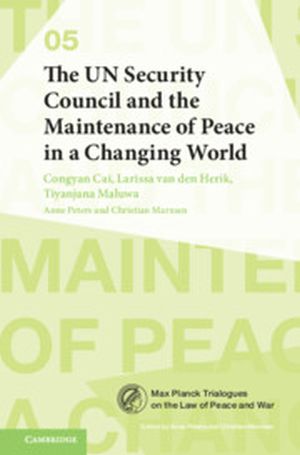We are now closed for the Christmas and New Year period, returning on Monday 5th January 2026. Orders placed during this time will be processed upon our return on 5th January.

How can the UN Security Council contribute to the maintenance of international peace and security in times of heightened tensions, global polarisation, and contestation about the principles underlying the international legal and political order? In this Trialogue, experts with diverse geographic, socio-legal, and ideational backgrounds present their perspectives on the Security Council's historic development, its present functions and deficits, and its defining tensions and future trajectories. Three approaches engage with each other: a power-focused approach emphasising the role of China as an emerging actor; an institutionalist perspective exploring how less powerful states, particularly the elected members of the Security Council, exert influence and may strengthen rule-of-law standards; a regionalist perspective investigating how the Security Council as the central actor can cooperate with regional organisations towards maintaining international peace and security.